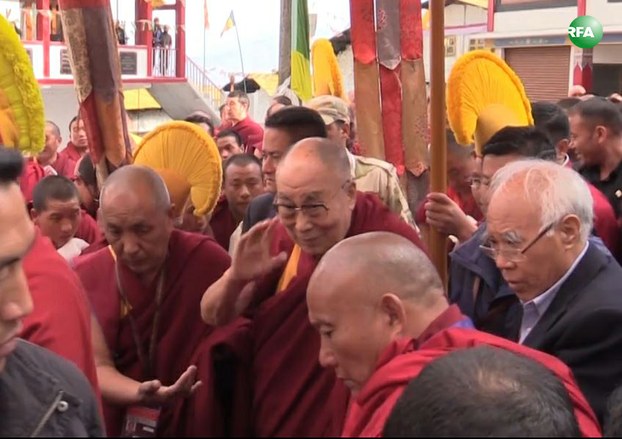Tibetet Segítő Társaság Sambhala Tibet Központ
Tibet Support Association Sambhala Tibet Center
székhely / telephely H-Budapest I. Attila út 123..
(00-36) 70 431 9343 (00-36)70 944 0260 (06-1)782 7721
sambhala@tibet.hu www.tibet.hu tibetpress.info
Facebook/Sambhala Tibet Központ Facebook/Tibett Segítő Társaság
MagnetBank/ 16200010-00110240
IBAN/HU94 16200010 00110240 00000000 SWIFT/HBWEHUHB
(1%) adószám/ 18061347-1-41
nyitva tartás/hétköznap 12.00-20.00 hétvégén előadás függő
» Retro» Tibeti művészet» Interjú» Levelek» Tibet Press» Tibet Press English» Dharma Press» Human Rights» Világ» Kína» Magyar» Ujgur» Belső-Mongólia » KőrösiCsoma» Élettér» Határozatok» Nyilatkozatok» tibeti művészet» lapszemle.hu» thetibetpost.com» eastinfo.hu» rangzen.net» ChoegyalTenzin» tibet.net» phayul.com» DalaiLama.com» vilaghelyzete.blogspot.com» Videók» Linkek» TibetiHírek» Szerkesztőség
Több ezer híve köszöntötte a Dalai Lámát a Tawang kolostorban az indiai határ menti államban
2017. április 7./RFA/TibetPress
Jelenleg csak angolul olvasható. Magyarul később.
eredeti cikk
Tibet’s spiritual leader, the Dalai Lama, arrived in the Buddhist town of Tawang, in northeastern India’s Arunachal Pradesh state Friday and was greeted by thousands of followers who had come to hear his religious teachings.
After traveling seven hours by car along roads lined with prayer flags, the 81-year-old monk reached the 17th-century Tawang Gaden Lhatse monastery, where he was welcomed by local monks and Buddhist devotees from throughout the region, including several from neighboring Bhutan.
A resident of Tawang, where the sixth Dalai Lama was discovered in the late 1600s, told RFA’s Tibetan Service that the visit had been highly anticipated.
“We were waiting for this great occasion to see His Holiness the Dalai Lama, so we worked hard to put up a good reception for him with prayers flags and other decorations,” said the resident, who spoke to RFA anonymously.
Loden, a Tibetan visiting from Switzerland, said residents had gone to great lengths to prepare for the spiritual leader’s arrival.
“Yesterday when I was coming down from the valley where most of the residents are nomads, they were cleaning the roads for several kilometers for His Holiness to pass through,” he said.
“It was really amazing to see the sense of devotion and faith and joy they felt in preparing to see His Holiness.”
The Dalai Lama—the 14th of his lineage—had planned to fly by helicopter from Guwahati in neighboring Assam state to Tawang monastery to hold spiritual teachings beginning on Wednesday, but heavy rainfall forced him to travel by road through the region, delaying his arrival.
He is expected to begin three days of teachings on Saturday.
Beijing angered
The nine-day visit to Arunachal Pradesh—which China claims as its territory—has angered Beijing, and on Thursday, China’s Foreign Ministry spokesperson Hua Chunying slammed India for extending the spiritual leader an invitation to the region.
“The Chinese side opposes the Dalai Lama's visit to the disputed area and any country's provision of venues for his anti-China separatist activities,” she said at a media briefing, adding that Beijing had “lodged stern representations” with New Delhi.
The Dalai Lama has lived in India since fleeing China in 1959 during an uprising against Chinese rule in Tibet, and New Delhi has warned Beijing to stay out of its internal affairs in response to criticism over the trip.
On Thursday, after consecrating the Thupsung Dhargyeling monastery in Dirang amid nearly 10,000 devotees, the Nobel Peace Prize laureate dismissed Beijing’s claims while speaking with reporters.
“My visit is purely spiritual—nothing [to do with] politics—so I wish some Chinese official would come here to observe what kind of activities [I am involved in],” he said.
The Dalai Lama also suggested that the Indian government should encourage Chinese Buddhists to visit important Buddhist sites in India, where the religion originated before being brought to China around the second century BC.
“China, historically, is a Buddhist country … So often I suggest to concerned Indian officials that … they create some sort of arrangement for Chinese Buddhists to make a pilgrimage in India,” he said.
“Some sort of arrangement to come for these Chinese pilgrims, I think, would be very useful—firstly, for individual satisfaction and secondly, for them … to see India’s freedom.”
He reiterated statements that Tibetans are not seeking an independent nation, but rather that China provide them with “meaningful self-rule, autonomy and must take full care of the environment.”
India and China have been embroiled in a row over the region for decades, as part of a greater dispute over their shared 3,500-kilometer (2,175-mile) border which prompted the brief 1962 Sino-Indian War. The two sides routinely accuse each other of intrusions across the Line of Actual Control (LAC), a de facto border that separates Indian-controlled territory from Chinese-controlled territory in the area.
The Dalai Lama has traveled to Arunachal Pradesh on six earlier occasions since 1983.
Reported by Passang Tsering for RFA’s Tibetan Service. Translated by Karma Dorjee. Written in English by Joshua Lipes.
